#enfp t
Text
me genuinely trying not to freak out when someone types someone and ends it with “-t” or “-a” like “infp-t” or “estp-a” STOP IT END THIS MADNESS
#its not that serious its not that serious its not that serious its not that— *gets shot*#THATS NOT WHAT TYPING IS !!!! PETITION TO BAN 16PERSONALITIES FROM THE EARTH#‘im an infp-t’ so ur an isfj 🧍♀️#‘im an entp-a’ so ur an infp 🧍♀️#LIKEEEE#ALL OF YOU ARE MISTYPED#typology#carl jung#infp#enfp#enfj#infj#entp#intp#intj#entj#estj#istj#isfj#esfj#esfp#isfp#istp#estp#rewriting
14 notes
·
View notes
Text
The Extraverted Intuitive Type // Inferior Introverted Sensation
Intuition is a function by which we conceive possibilities. A sensation type would call this object a bell, but a child would imagine all sorts of things you could do with it. It could be a church tower, this book could be a village, etc. In everything there is a possibility of development. In mythology, intuition is very often represented by the nose. One says: " I smell a rat." that is. my intuition tells me that there is something wrong. I don't know quite what. but I can smell it! Then three weeks later the rat leaps out of its hole and one says: " Oh, I smelt it, I had a hunch there was somethig in the air!" These are unborn possibilities, the germs of the future. Intuition is therefore the capacity for intuiting that which is not yet visible, future possibilities or potentialities in the background of a situation.
The extraverted intuitive type applies this to the outer world, and therefore will score very high in surmising the future outer developments around him. Such types are very often found among business people. They are enterprisers who have the courage to manufacture and market new inventions. One finds them among journalists and frequently among publishers: they know what will be popular next year. They will bring out something which is not yet the fashion but soon will be, and they are the first to put it on the market.
Stockbrokers, too, will have a certain knack which tells them that a particular stock will go up, that the market will be bullish or bearish, and they will make money through sensing the rise and fall of stocks. One finds them wherever there is something new brewing, even in the more spiritual realms. They will always be in the advance movement.
It is generally the creative artist who creates the future. A civilisation. which has no creative people is doomed. So the person who is really in touch with the future, with the germs of the future, is the creative personality. Now the extraverted intuitive, because he is capable of sniffing the wind and knowing what the weather will be tomorrow, will see that this perhaps completely unknown painter or writer is the man of tomorrow, and therefore he will be fascinated. His intuition can recognise the value of such a creative person.
Creative people themselves are introverted and are so occupied with their creations that they cannot attend to the bringing out of their work. The work itself takes up so much of their energy that they, cannot be bothered with how it should be presented to the world, how to advertise it, or anything of that kind. Moreover, any kind of purposiveness poisons creative processes. Very often, then, the extraverted intuitive comes along and helps. But, naturally, if he does that all his life, he begins projecting a minor creative ability of his own onto the artist, and so he loses himself. Sooner or later such people have to pull themselves out of their extraversion and say: "Now, even if it is on a minor scale, what is my creativeness?" And then they will be forced down into their inferior sensation, and instead of attending to other people's crea-tiveness, they will have to attend to their own inferior sensation and to what might come out of it.
Intuition needs to look at things from afar or vaguely in order to function, so as to get a certain hunch from the unconscious, to half shut the eyes and not look at facts too closely. If one looks at things too precisely, the focus is on facts, and then the hunch cannot come through. That is why intuitives tend to be unpunctual and vague. A disadvantage of having this as a main function is that the intuitive type sows but rarely reaps. For instance, if one starts a new business, there are generally initial difficulties: the thing does not work immediately; it is necessary to wait a certain time for it to become profitable. The intuitive very often does not wait long enough. He starts the business, but that is enough for him; he sells out and loses on it, but the next owner makes a lot of money out of the same business. The intuitive is always the one who invents but who in the end gets nothing out of it. But if he is more balanced and can wait a little, and if he does not dissociate completely by identifying with his main function, then he is a person who can store up new things in all the corners of the world.
The extraverted intuitive tends not to attend to his body and his physical needs: he simply does not know when he is tired, he does not notice it. It takes a breakdown to show him. He also does not know when he is hungry. If he is an exaggerated one-sided type, he does not know that he has any endo-somatic feelings. Inferior sensation, like all inferior functions, is in such people slow, heavy, and loaded with emotion. Because it is introverted, it is turned away from the outer world and its affairs. It has, like all inferior functions, a mystical quality about it.
I once analysed such an extraverted intuitive type, a businessman who had started a great many businesses in a foreign country and had also speculated a lot in gold mines and the like. He always knew where possibilities were and made a large fortune in a very short time, absolutely honestly - quite decently - simply because he knew where to invest. He knew what was coming, what would happen in a few years, and he was always on the spot first and got the whole business in hand. His introverted sensation - he was rather a split personality - came up first as a very dirty, bad-tempered tramp who appeared in his dreams. This tramp sat around in inns, wore dirty clothes, and we did not know what this fellow wanted of the dreamer. I induced him to talk to the tramp in active imagination. The tramp said that he had been responsible for the physical symptoms which had brought the man to analysis, and that they had been sent because he (the tramp) did not get enough at-tention. So, in active imagination, he asked what he should do. The tramp said that he should, once a week, dress in clothes such as the tramp wore, go for a walk in the country with him, and pay attention to what he had to say.
I advised the dreamer to follow the advice precisely. The result was that he took long walks through many parts of Switzerland, staying in the most simple inns, unrecognized by anybody. During this time he had a great number of overwhelming inner experiences which came through contact with nature: the sunrise, and small things like seeing a certain flower in a corner of a rock, and so on. It struck right to the core of his personality and revealed a tremendous number of things. I can only describe it as experiencing, in a very primitive way, the Godhead in nature. He came back very silent and quieted, and one had the feeling that something had moved in him which had never moved before. His compulsory symptoms disappeared completely during those weekly walks. Then came the problem of how he could keep this experience and avoid slipping back when he got home to his own country. So we consulted the tramp again who said that he would let him off the symptoms if he would take one afternoon each week, go alone into nature, and continue his talks with him. The man then left. From his letters I learnt that he did this for a while, but then he slipped back to his old habits - there was too much work, he was starting three new businesses, and there were so many meetings. So he postponed the tramp, always saying, "Next week, next week - sure I am coming, but next week." And then he promptly got his symptoms back! That taught him; he switched back and walked regularly and was all right again. It then crystallised into buying a little farm and having a horse.
One afternoon a week he attended to his horse with what one could only call religious devotion. The horse was his friend, so to speak, and like a ritual he went to visit it and ride it and look after it every week. From then on he had peace. I am sure a lot is going on inwardly, but I haven't heard much from him except for Christmas cards saying that he was getting on all right. And, of course, photographs of the horse!
There one sees how the inferior function is the door to experiencing the deeper layers of the unconscious. This intuitive type got out of his ego and | ego purposes via this contact with nature and with the horse. One sees very clearly that even if the inferior function appears outside - in a horse, for example - it obviously carries a symbolic meaning. Attending to the horse was for him attending to his own physical and instinctual side: the horse was a first personification of the impersonal collective unconscious for him. It is important for an intuitive type to do this concretely and very slowly, and not immediately exclaim: "Oh, the horse is a symbol of the unconscious," etc. He must stick to the actual horse and attend to it, even though he knows it is a symbol.
Source: Von Franz on the Four Irrational Types
#personality theory#personality types#typology#jung#jungian typology#en#ne#en(f)#en(t)#enfp#entp#cognitive functions
8 notes
·
View notes
Text
anyone else do personality tests for their ocs? im redoing the ones for the favs and getting the exact same answers lmaoo
#roy how the HECK are you still *very strongly* an enfp?????#incredible; i thought he was getting into entp territory or something#blair is istj apparently! shed gotten intp a while ago but ive done a good amount of work on her since then#she went from my personality; to my brother´s lol#and i dont even need to redo aki´s#that boy is infp through and through#so in summary:#roy: ENFP-t 2w3#aki: INFP 6w7#blair: ISTJ 1w2#< - those are in case i forget again lol#also... friends and oc havers feel free to drop your or your ocs personality types#i love random knowledge dfhskjghfskjahf#shut up sheo#oc talk#actually blair istj isnt quite right i think#oh well lol
2 notes
·
View notes
Text




🩷There was an effort to make ENFP in AI... I think it came out well^^
#enfp#mbti#mbti art#mbti personality types#16 personalities#personality types#myers briggs#ai#ai art#art#enfp-t
7 notes
·
View notes
Text
mbti memes i made because im bored
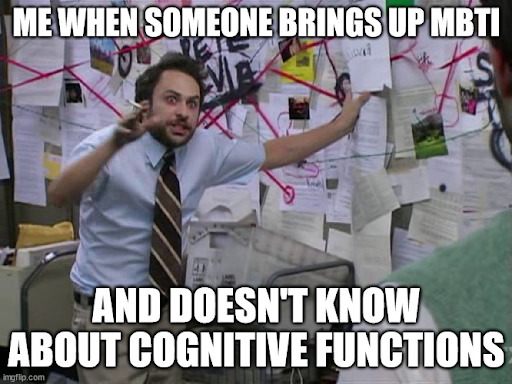



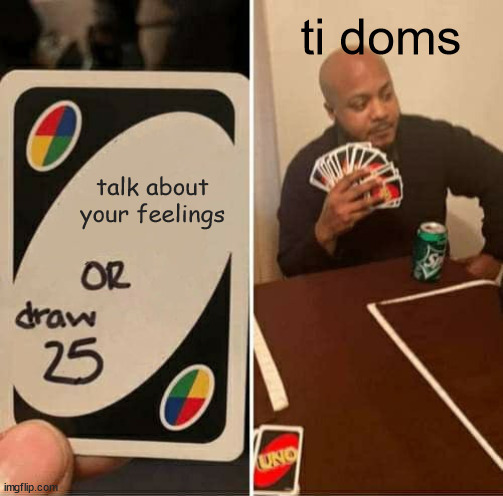

17 notes
·
View notes
Text
Okay, fuck you actually.

#this test broke me a bit#god I need meds#When someone thinks highly of you you wonder how long it will take them to feel disappointed in you OWWWWWW STOP IT#im a ENFP-T btw
2 notes
·
View notes
Text
LETS FUCKING GOOOO

ENFP SUPREMACY 💪‼️🔥
2 notes
·
View notes
Text






Took the personality test on 16personalities.com and showed that I am a Campaigner/ENFP-T type of person. ENFP-T means that I am extraverted, intuitive, feeling, prospecting and turbulent. Some of the traits that's on the result were new to me, like I didn't thought that I am intuitive rather than observant. This type of tests are helpful to better know ourselves and to be aware of our strength and weaknesses.
2 notes
·
View notes
Note
hi just realized your bio says your an enfp-t, I'm an infp-t :)) - 🐰
Ohhh👀👀 to be honest i really like Infp-t personality! Its mysterious for me Hahahah
2 notes
·
View notes
Note
hey tafeee, what’s your mbti??
Hi anon^^
I have to admit I never took the test until I just saw your ask;)

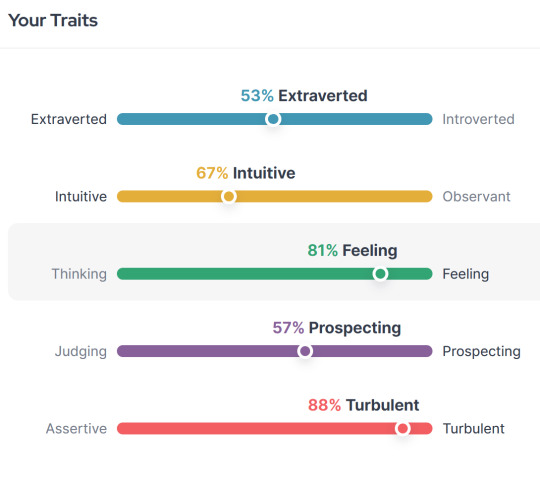
But apparently I am ENFP-T though I never really expected myself to end up as extroverted but I guess I am very much in the middle XD
I do enjoy my time alone as much as I glow up in lovely company 😇✌🏼
Lots of love
🧚🏻♀️
1 note
·
View note
Text
Did an mbti type test and om my god where are the hidden cameras
0 notes
Text
Extraverted Irrational Types
I call the two preceding types irrational for reasons already referred to; namely, because their commissions and omissions are based not upon reasoned judgment but upon the absolute intensity of perception. Their perception is concerned with simple happenings, where no selection has been exercised by the judgment. In this respect both the latter types have a considerable superiority over the two judging types. The objective occurrence is both law-determined and accidental. In so far as it is law-determined, it is accessible to reason; in so far as it is accidental, it is not. One might reverse it and say that we apply the term law-determined to the occurrence appearing so to our reason, and where its regularity escapes us we call it accidental. The postulate of a universal lawfulness remains a postulate of reason only; in no sense is it a postulate of our functions of perception. Since these are in no way grounded upon the principle of reason and its postulates, they are, of their very nature, irrational. Hence my term ‘irrational’ corresponds with the nature of the perception-types. But merely because they subordinate judgment to perception, it would be quite incorrect to regard these types as unreasonable. They are merely in a high degree empirical; they are grounded exclusively upon experience, so exclusively, in fact, that as a rule, their judgment cannot keep pace with their experience. But the functions of judgment are none the less present, although they eke out a largely unconscious existence. But, since the unconscious, in spite of its separation from the conscious subject, is always reappearing on the scene, the actual life of the irrational types exhibits striking judgments and acts of choice, which take the form of apparent sophistries, cold-hearted criticisms, and an apparently purposeful selection of persons and situations. These traits have a rather infantile, or even primitive, stamp; at times they are astonishingly naive, but at times also inconsiderate, crude, or outrageous. To the rationally orientated mind, the real character of such people might well appear rationalistic and purposeful in the bad sense. But this judgment would be valid only for their unconscious, and, therefore, quite incorrect for their conscious psychology, which is entirely orientated by perception, and because of its irrational nature is quite unintelligible to the rational judgment. Finally, it may even appear to a rationally orientated mind that such an assemblage of accidentals, hardly deserves the name ‘psychology.’ The irrational type balances this contemptuous judgment with an equally poor impression of the rational; for he sees him as something only half alive, whose only aim in life consists in fastening the fetters of reason upon everything living, and wringing his own neck with criticisms. Naturally, these are gross extremes; but they occur.
From the standpoint of the rational type, the irrational might easily be represented as a rational of inferior quality; namely, when he is apprehended in the light of what happens to him. For what happens to him is not the accidental—in that he is master—but, in its stead, he is overtaken by rational judgment and rational aims. This fact is hardly comprehensible to the rational mind, but its unthinkableness merely equals the astonishment of the irrational, when he discovers someone who can set the ideas of reason above the living and actual event. Such a thing seems scarcely credible to him. It is, as a rule, quite hopeless to look to him for any recognition of principles in this direction, since a rational understanding is just as unknown and, in fact, tiresome to him as the idea of making a contract, without mutual discussion and obligations, appears unthinkable to the rational type.
This point brings me to the problem of the psychic relation between the representatives of the different types. Following the terminology of the French school of hypnotists, the psychic relation among the more modern psychiatrists is termed I ‘rapport’. Rapport chiefly consists in a feeling of actual accord, in spite of recognised differences. In fact, the recognition of existing differences, in so far as they are common to both, is already a rapport, a feeling of accord. If we make this feeling conscious to a rather high degree in an actual case, we discover that it has not merely the quality of a feeling that cannot be analysed further, but it also has the nature of an insight or cognitional content, representing the point of agreement in a conceptual form. This rational presentation is exclusively valid for the rational types; it by no means applies to the irrational, whose rapport is based not at all upon judgment but upon the parallelism of actual living events. His feeling of accord is the common perception of a sensation or intuition. The rational would say that rapport with the irrational depends purely upon chance. If, by some accident, the objective situations are exactly in tune, something like a human relationship takes place, but nobody can tell what will be either its validity or its duration. To the rational type it is often a very bitter thought that the relationship will last only just so long as external circumstances accidentally produce a mutual interest. This does not occur to him as being especially human, whereas it is precisely in this situation that the irrational sees a humanity of quite singular beauty. Accordingly each regards the other as a man destitute of relationships, upon whom no reliance can be placed, and with whom one can never get on decent terms. Such a result, however, is reached only when one consciously tries to make some estimate of the nature of one’s relationships with one’s fellow-men. Although a psychological conscientiousness of this kind is by no means usual, yet it frequently happens that, notwithstanding an absolute difference of standpoint, a kind of rapport does take place, and in the following way. The one assumes with unspoken projection that the other is, in all essential points, of the same opinion as himself, while the other divines or senses an objective community of interest, of which, however, the former has no conscious inkling and whose existence he would at once dispute, just as it would never occur to the latter that his relationship must rest upon a common point-of-view. A rapport of this kind is by far the most frequent; it rests upon projection, which is the source of many subsequent misunderstandings.
Psychic relationship, in the extraverted attitude, is always regulated by objective factors and outer determinants. What a man is within has never any decisive significance. For our present-day culture the extraverted attitude is the governing principle in the problem of human relationship; naturally, the introverted principle occurs, but it is still the exception, and has to appeal to the tolerance of the age.
Source: Psychological Types
#personality theory#personality types#typology#cognitive functions#jung#jungian typology#en#es#ne#se#en(f)#en(t)#es(f)#es(t)#enfp#entp#esfp#estp
3 notes
·
View notes
Text
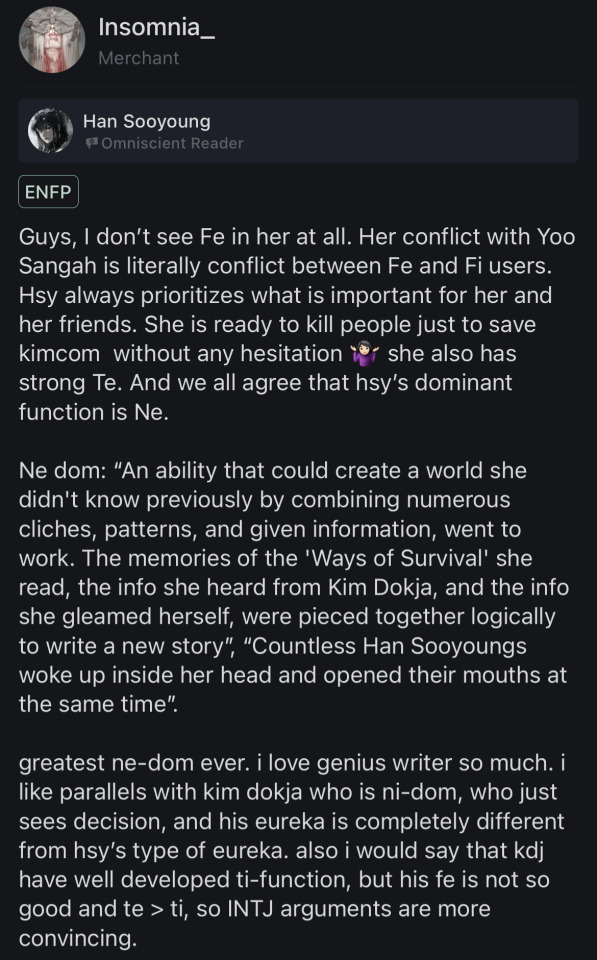
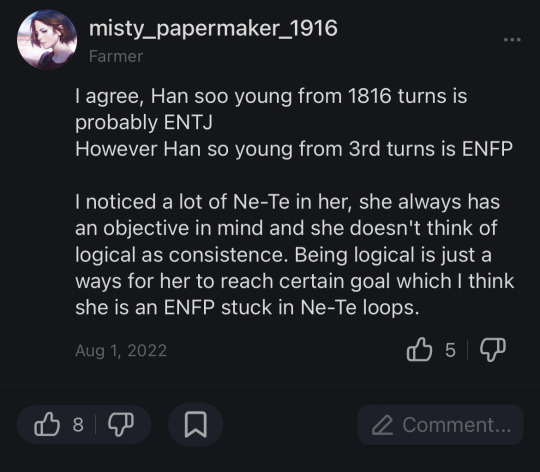
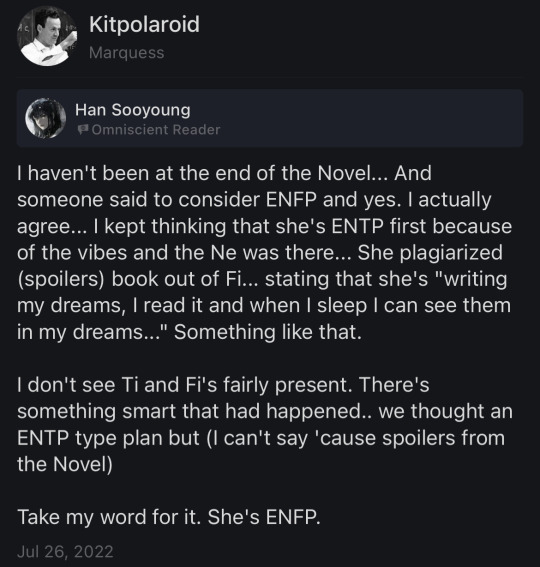
enfp han sooyoung...
#would explain why people mistake her as ENTJ too because she has very strong Te (ENTPs dont have Te - ENFPs do)#so really the T vs F debate comes from whether she uses Fe or Fi (which you can argue for both)
1 note
·
View note
Photo







(MBTI Personality Test : ISFP Pet Bandana by DanBang7에서)
#findyourthing#redbubble#https://www.redbubble.com/i/t-shirt/MBTI-Personality-Test-ISFP-by-DanBang7/117158857.NL9AC?asc=u#mbti personality introvert infj myers briggs psychology intj type infp intp briggs enfp myers extrovert istj introverted entp istp isfj enne
0 notes
Text


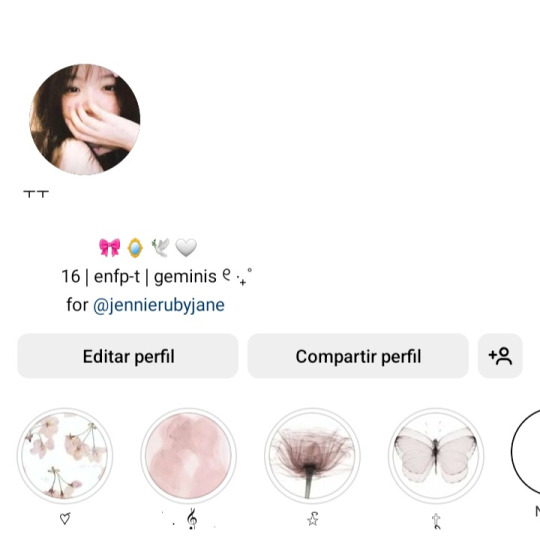

⠀⠀⠀⠀⠀⠀🎀 🪞 🕊️ 🤍
⠀⠀⠀16 | enfp-t | geminis ୧ ‧₊˚
⠀⠀ for @idol


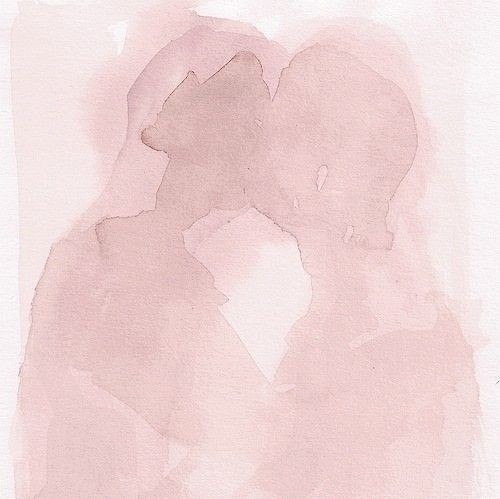
⠀⠀⠀⠀
#s2bunnys#messy packs#random layouts#kpop messy#messy layouts#lq icons#messy moodboard#kpop gg#instagram packs#instagram inspo#instagram#messy icons#messy locs#messy aesthetic#messy bios
185 notes
·
View notes
Text
perspective of the 16 types by a 9w1 that is done with their sh*t
the last post of my perspective of the types was when I was a 17-year-old ESFP, wearing rose-colored glasses.
but I'm done playing nice.
this is for people with zero self-awareness and the maturity of a fifteen-year-old. I'm just being honest for once, so feel free to get offended (∩^o^)⊃━☆
~~~
ENTP - you drain me
ENFP - you drain me equally, and it boggles my mind how you can't read the room at all
ISFP - your inf. Te sucks and it makes me also not want to do stuff and just sit on the couch with you. fine, i'll watch three movies with you, but anyways, you suck.
ESFP - i don't wanna be around you unless you're 35+ years old
ESTP - stop complaining, we're all suffering here
INTP - you're overrated, and so is your nerdiness
ENTJ - i don't get why you want to be in charge so badly. let the idiots wreck themselves for once.
ISTJ - your rigid social laws ain't flying with me. I'll wear my red Converse whenever i like, thanks
INFJ - i don't care about your mystical vibe, it's probably just a side-effect of over-thinking and mental unhealth
ISFJ - you're too nice for your own good, and your social persona bothers me cuz it's not the real you.
ESFJ - you're even worse with this, and you talk too much. i get that you care but like... please be more genuine about how you feel
INTJ - do you enjoy that your mental illness and depression make me really sad? i think you do
ISTP - ... no comment
INFP - sorry that you're the only one with real feelings and deep thoughts, but anyways, thanks for all the music.
ESTJ - you're hustling, but are you living?
ENFJ - whatever story you're telling me, i stopped listening five minutes ago.
#mbti#esfp#isfp#istp#estp#enfp#infp#entp#intp#intj#entj#infj#enfj#esfj#isfj#estj#istj#perspective of the types#16 personalities#is everyone offended yet?#i feel so mean tho#9w1#enneagram 9
195 notes
·
View notes